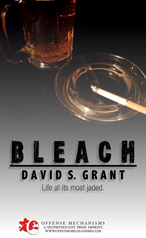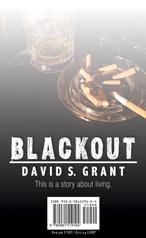|
|
BLEACH
| BLACKOUT
two novels by David S. Grant
Publisher:
Offense Mechanisms
ISBN-10: 0-9815191-0-5
ISBN-13: 978-0-9815191-0-4
312 pages
paperback:
$16.99 $19.99 + S/H
[click
for details]
|
|
R E V I E W O
F B L E A C H | B L A C K O U T
:
"This story probably isn't for you."
So begins Bleach, the first of
two new novels by David S. Grant packaged in one curiously mind
bending volume by Offense Mechanisms, Silverthought's slutty
little sister of an imprint. Truer opening words have probably
been said before, but in this case, this opener is true enough
for most, but not for me. This story, and the following story
of Blackout, are for me, and maybe you, too.
Bleach does not necessarily cover
new ground. Those who have read Grant's previous ST title, Corporate
Porn, will immediately recognize the initial setting of
a bland, oppressive office space and the thirtysomething protagonist
who can't wait to get out of it. If you've ever clocked in your
time staring at cubicle walls, sitting through monotonous, agonizing
meetings, or having to explain the most basic functions of a
spreedsheet program, this story is for you. Bleach introduces
us to Jeremy, a young man who's looking for home. Leaving NYC
and returning to his hometown in Wisconsin for the holidays,
Jeremy has a little secret. His cheating girlfriend knows, his
Magnum, P.I.-obsessed parents know, but his best friends Chip
and Stoner don't know. This secret initiates a reevaluation
of his life—is there more to the concept of home than partying
like a rock star with old friends? How do you define home—is
it a place you return to or a place you haven't found yet? Through
rolling flashbacks that depict previous New Year's Eves, we
see what brought Jeremy to his present disenchantment. The book
builds on that framework and culminates in New Year's Eve 2004.
The booze is flowing, the shrooms are questionable, and someone
has a shotgun.
Blackout, the second book in this
edition, is by far a more frantic read, less grounded in quiet
contemplation of home and growing up, more dealing with the
desire for revenge, for living life to its fullest. It opens
in Vegas, in one of the best stream of consciousness full tank
of gas full bag of blow full-on hard-on bachelor party scenes
I've ever read. Jeremy and Chip are in Vegas for Stoner's bachelor
party, and let's just say there may have been a murder. Blackout
follows the uncertainty our protagonists feel—what really
happened? How will the trial end? To what lengths will friends
go to avenge a murder? This is an older Jeremy, someone who
has been changed by the events of Bleach, but someone
who is still searching. Has he found home? Has he found someone
special in Mary? How will he live with loss—and how will
he seek revenge? Shorter than Bleach, Blackout
is still a fine piece of writing in its wreckless depiction
of both shameless debauchery and the quiet questions that emerge
from loss.
Yeah, these books are for me. Are they
for the typical reader? Maybe not. Some might find the constant
drinking and drugging and screwing overwhelming or monotonous,
but Grant's strength lies in his almost clinical detachment
from these events. Those not well versed in the substance abuse
scene might not believe that someone could live like this and
keep living, but let's face it, those readers probably aren't
OM's target demographic. Reading B|B brought back many
fond and not so fond memories. I saw a lot of myself and my
buddies in Grant's characters, the conversations about, well,
nothing, the endless supply of grass and beer, the quick basement
fucks you might regret later when the girl ends up overdose
dead. Sometimes these books read like an encyclopedia article
on all the things your parents told you never to do, but it's
Grant's ability to insert absolutely hilarious quips and pop
culture references and ridiculous situations into this play
by play account of wreckless youth that makes it so very worthwhile.
We all need escapes; we all need to find home. David Grant's
Bleach | Blackout has a lot of heart buried deep down
under the cigarette butts. Pick up B|B for a quick, sexy
slice of awesome. Sure, it might smell like smoke, but it tastes
like Nicolas Cage.
I N T E R V I E W :
Andy Laughton: I see a lot of
Corporate Porn in Bleach and Blackout,
not just the style but the theme of
resistance against the corporate machine. What do you see as
the main similarities and differences between the books?
David S. Grant: I have and still
do spend most of my life in the corporate environment. The mundane
events form a nice backdrop for the moral issues most of my
characters have. These books are definitely similar in that
the characters want to find a way out. It's perfectly natural
on a summer day to be looking out your office window, see the
guy working construction and wish you were him. The construction
worker is looking up at the office, wishing he was there. A
twisted circle of life.
Bleach is much more grounded than
both Corporate Porn and Blackout. I don't believe
there are many parts of Bleach where the reader may not
be able to picture this happening. Maybe not relate exactly,
but heard about similar situations. In Blackout and Corporate
Porn there were liberties taken that you can only take when
writing fiction. Specifically the courtroom scene in Blackout—I
don't think many saw that episode of "Law and Order."
AL: What's
your target readership? The typical reader probably won't dig
the sex, drugs and rock 'n roll in B|B, but as someone who's
lived both the drunk college life and suffered through the twentysomething
corporate machine, I think you really captured it perfectly.
DSG: Damn good question. I do
struggle with this at times, but not for a very long time. In
the end, I don't care—that has never been the point. That
being said, I do think many people have either lived part of
it, or have always wanted to, and use stories like mine as an
escape. Personally, for me, it's a little of both.
AL: The concept of "going
home" is a strong thread throughout Bleach. Could
you talk a little bit about that? Is there a place in your life
that generates that feeling in you, not necessarily your hometown,
just a place or time you're drawn back to?
DSG: Bleach was about Jeremy going home, but once
he's there he realizes that maybe that isn't home anymore. Unless
you live in the same hometown you grew up, most will struggle
with this predicament. When writing Bleach I always felt
this was the end of a phase for him and that he would settle
down (surgery permitting). Of course, we now know with Blackout
that that never happened.
AL: You list your major writing influences as Bret Easton
Ellis, F. Scott Fitzgerald, Chuck Palahniuk, and Hunter S. Thompson.
What did you take from each of them to use in your own writing
practice?
DSG: The way Ellis creates a scene
by describing the emotions and actions, not the color of the
coffee table or how many plants are in the room. The language
of Hunter S. Thompson, how it bites you as you read his work.
The romance with an edge of F. Scott Fitzerald. The Beautiful
and Damned is a book I always pick up and always have difficulty
putting down. And of course, Palahniuk's ability to shock through
social commentary.
AL: Your flash/short pieces are always reader favorites
on Silverthought. Could you discuss the differences if any in
your writing practice between short fiction and longer forms
like novels?
DSG: For novels I need a high
level outline and an ending. Not that I'll necessarily keep
the ending, but I learned early that having an end in sight
keeps me motivated. My writing practice is somewhat unorthodox
in that I very much binge. Once I start a book I continue on
it until I finish, rarely taking breaks longer than one day.
AL: How much of yourself do you put into your characters?
Are Jeremy, Stoner and Chip all different parts of you or based
on friends or people you know, or are they completely fictional?
DSG: A combination of myself,
friends, people I know, and fiction. The funny thing is you
probably wouldn't guess correctly the parts based on truth vs.
fiction. The main narrator usually has a lot of my thoughts
because I always feel like as I am writing my books I'm walking
in their shoes. When they shoot heroin, I shoot heroin. Fictionally
speaking, of course.
AL: What was the last book you read, movie you saw, song
you loved, drink you had?
DSG: Book—Pure Sunshine, movie—27
Club, song—the new Mariah Carey. Actually I'm just
kidding, it's been a while since I've fallen in love with a
song. I pretty much like anything with two guitars or more in
the band, but seriously though, I'm just kidding about Mariah
Carey. Drink—ten pints of Stella. (Is there any other way
to drink Stella?)
AL: Do you believe that children are our future? What
would you say to a child who wants to go into finance? Is B|B
a cautionary tale, or should young people revel in the debauchery
before they're locked into lives of corporate servitude?
DSG: I think if you read between
the lines you'll find that the point is that you can have it
both ways if you want, but you need balance. Everyone has their
"edge". It's important to push yourself to that edge.
Just remember, some edges are higher than others.
AL: What's next for David Grant? Writing projects, screenplays,
movie deals and superstardom? Have any juicy details you'd like
to share about Bliss, the prequel to Bleach?
DSG: I have recently published
a short story collection, Emotionless Souls, and a novella,
The Last Breakfast. I am in the process of writing Bliss,
the prequel to Bleach, which takes a look at the senior
year of high school of Jeremy, Stoner, and Chip. Spoiler alert:
There are drugs involved.

--
O N L I N E
| F O R U M
| P R I N
T --

